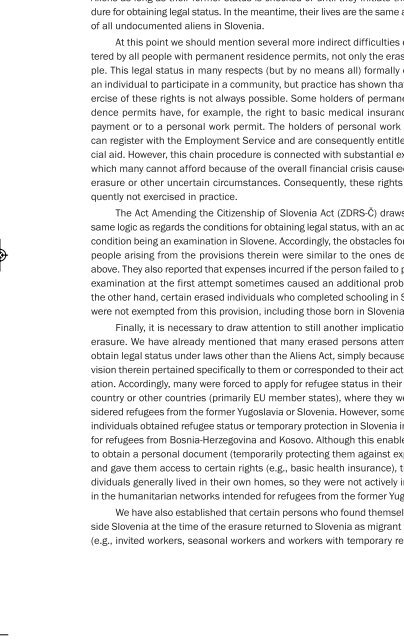The Scars of the Erasure_web
The Scars of the Erasure_web
The Scars of the Erasure_web
- No tags were found...
You also want an ePaper? Increase the reach of your titles
YUMPU automatically turns print PDFs into web optimized ePapers that Google loves.
<strong>Erasure</strong>_4a 10.1.11 20:29 Page 75THE ERASURE AS A TESTING GROUND FOR EUROPEAN MIGRATION POLICIES75than is <strong>the</strong> upper limit stipulated by law as a condition for acquiring citizenship,is similar. After 1999, <strong>the</strong> situation <strong>of</strong> both mentioned categories improved in<strong>the</strong> sense that <strong>the</strong>y cannot be removed from <strong>the</strong> country, but <strong>the</strong>y are still submittedto regular police supervision and are (still!) detained in <strong>the</strong> Center forAliens as long as <strong>the</strong>ir former status is checked or until <strong>the</strong>y initiate <strong>the</strong> procedurefor obtaining legal status. In <strong>the</strong> meantime, <strong>the</strong>ir lives are <strong>the</strong> same as those<strong>of</strong> all undocumented aliens in Slovenia.At this point we should mention several more indirect difficulties encounteredby all people with permanent residence permits, not only <strong>the</strong> erased people.This legal status in many respects (but by no means all) formally enablesan individual to participate in a community, but practice has shown that <strong>the</strong> exercise<strong>of</strong> <strong>the</strong>se rights is not always possible. Some holders <strong>of</strong> permanent residencepermits have, for example, <strong>the</strong> right to basic medical insurance uponpayment or to a personal work permit. <strong>The</strong> holders <strong>of</strong> personal work permitscan register with <strong>the</strong> Employment Service and are consequently entitled to socialaid. However, this chain procedure is connected with substantial expenseswhich many cannot afford because <strong>of</strong> <strong>the</strong> overall financial crisis caused by <strong>the</strong>erasure or o<strong>the</strong>r uncertain circumstances. Consequently, <strong>the</strong>se rights are frequentlynot exercised in practice.<strong>The</strong> Act Amending <strong>the</strong> Citizenship <strong>of</strong> Slovenia Act (ZDRS-Č) draws on <strong>the</strong>same logic as regards <strong>the</strong> conditions for obtaining legal status, with an additionalcondition being an examination in Slovene. Accordingly, <strong>the</strong> obstacles for erasedpeople arising from <strong>the</strong> provisions <strong>the</strong>rein were similar to <strong>the</strong> ones describedabove. <strong>The</strong>y also reported that expenses incurred if <strong>the</strong> person failed to pass <strong>the</strong>examination at <strong>the</strong> first attempt sometimes caused an additional problem. On<strong>the</strong> o<strong>the</strong>r hand, certain erased individuals who completed schooling in Sloveniawere not exempted from this provision, including those born in Slovenia.Finally, it is necessary to draw attention to still ano<strong>the</strong>r implication <strong>of</strong> <strong>the</strong>erasure. We have already mentioned that many erased persons attempted toobtain legal status under laws o<strong>the</strong>r than <strong>the</strong> Aliens Act, simply because no provision<strong>the</strong>rein pertained specifically to <strong>the</strong>m or corresponded to <strong>the</strong>ir actual situ -ation. Accordingly, many were forced to apply for refugee status in <strong>the</strong>ir “home”country or o<strong>the</strong>r countries (primarily EU member states), where <strong>the</strong>y were consideredrefugees from <strong>the</strong> former Yugoslavia or Slovenia. However, some erasedindividuals obtained refugee status or temporary protection in Slovenia intendedfor refugees from Bosnia-Herzegovina and Kosovo. Although this enabled <strong>the</strong>mto obtain a personal document (temporarily protecting <strong>the</strong>m against expulsion)and gave <strong>the</strong>m access to certain rights (e.g., basic health insurance), <strong>the</strong>se individualsgenerally lived in <strong>the</strong>ir own homes, so <strong>the</strong>y were not actively includedin <strong>the</strong> humanitarian networks intended for refugees from <strong>the</strong> former Yugoslavia.We have also established that certain persons who found <strong>the</strong>mselves outsideSlovenia at <strong>the</strong> time <strong>of</strong> <strong>the</strong> erasure returned to Slovenia as migrant workers(e.g., invited workers, seasonal workers and workers with temporary residence


